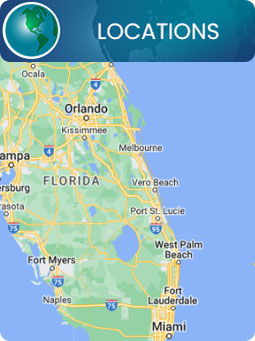What to Know About an Occipital Nerve Block?
In some cases, such as occipital neuralgia and cluster headaches, an occipital nerve block may provide short-term pain relief. Additionally, it can assist with headaches and neck pain. Results may differ depending on the individual. Allow us to assist with your pain relief so that you can resume leading the best life possible. For more information, contact us today or schedule an online appointment. We have convenient locations to serve you in Orlando FL, Jensen Beach FL, Malabar Palm Bay FL, Atlantis FL, Fort Pierce FL, Winter Park FL and Plantation, FL.


Table of Contents:
What is an occipital nerve block?
What is an occipital nerve block used for?
How long will an occipital nerve block last?
How does an occipital nerve block work?
Nerve blocks have become an integral component of pain management and treatment, providing long-lasting and very effective results, particularly in patients who have not been able to experience pain relief from more traditional treatment methods. Migraines and chronic headaches can quickly become a debilitating condition, vastly affecting the quality of life of the patient as they regularly experience life-interrupting pain. Occipital nerve blocks are one of the safest nerve block options available today and have proven to provide significant pain relief in many patients suffering from a number of conditions, including headaches and migraines.
An occipital nerve block is the administration of an anesthetic medication injection, or sometimes a steroid medication injection instead, into the head near one of the three occipital nerves to provide long-lasting prevention and relief from headaches, inflammation, and other conditions. These nerves are part of a group of nerves that are located in the back of the head, closer to the base of the skull, with most people having two of each of the three types of occipital nerves. There is typically not much required of the patient when having a nerve block administered, but it is fairly common for patients to opt for some form of sedation to prevent experiencing discomfort or pain during the procedure as much as possible. The procedure itself is typically an outpatient procedure, meaning that the patient will not need to stay at a hospital overnight following the administration of the medication unless deemed medically necessary due to an adverse reaction.
The primary use for occipital nerve blocks is to reduce the pain caused by headaches as well as to reduce the frequency of the headaches from occurring. They will only be recommended if other types of headache treatments have proven ineffective or insufficient. There are a few specific types of headaches for which occipital nerve blocks provide significant relief, including migraine headaches, cluster headaches, occipital neuralgia, cervicogenic headaches, and post-dural puncture headaches. This type of treatment is also regularly used to treat injuries such as whiplash or others that are similar, as well as neck pain that is localized to the upper back of the neck and has even proven to provide symptom relief for conditions that are causing nerve irritation including ear pain and tinnitus. Additionally, occipital nerve blocks can sometimes be used as a diagnostic tool by being injected near the occipital nerves to determine if the pain that is being experienced is originating from the occipital nerves or elsewhere.
While the procedure itself only takes around 5 minutes and the benefits can start to be fully realized within a few days, occipital nerve blocks can last anywhere from several weeks to several months. Each patient will react a bit differently to the injection, making this exact timeline difficult to predict, but this timeline should be discussed with the injection provider to determine a more accurate timeline that takes all relevant factors of the patient and their specific condition into account. Patients who found significant relief from an occipital nerve block and who had experienced very minimal side effects will often choose to continue receiving another injection of the medication once the previous medication has worn off in order to prolong the benefits for as long as possible. Those who suffer from chronic headaches will often choose to continue receiving the injections three to four times a year to achieve significant pain relief that does not lessen in between treatments. A series of occipital nerve block injections have shown to provide significantly longer-lasting results in patients who are using the procedure to treat their headaches or occipital neuralgia.
Occipital nerve blocks work by using a medication that is a mixture of an anesthetic and a steroid, which provides both short-term pain relief as well as long-term numbing of the area into which the injection is administered. So, when injected into the specific areas of the head where one of the three types of occipital nerves is located (the type of occipital nerve that is chosen for treatment will vary depending on the cause of the pain), the medication numbs the nearby nerves, enabling them from transmitting signals to the brain that pain is being experienced within that area, effectively allowing the patient to no longer experience that pain as the medication continues to work.
For more information, please contact us or book an appointment online. We serve patients from Orlando FL, Conway FL, Edgewood FL, Jensen Beach FL, Ocean Breeze FL, Rio FL, Malabar Palm Bay FL, Melbourne FL, Atlantis FL, Palm Springs FL, Boynton Beach FL, Fort Pierce FL, White City FL, St Lucie FL, Plantation FL, Pine Island Ridge FL, Lauderhill FL, Winter Park FL, Bertha FL, Alafaya FL and surrounding areas.

CONDITIONS WE TREATED:
- Facet Joint Disorders
- Back Surgery Complications
- Migraines
- Herniated Discs
- Back Pain
- Lower Back Pain
- Neck Pain
- Sciatica Pain
- Abdominal Pain
- Compression Fractures
- Joint Pain Treatments
- Shoulder Pain Treatments
- Elbow Pain Treatments
- Hip Pain Treatments
- Knee Pain Treatments
- Diabetic Peripheral Neuropathy
- Complex Regional Pain Syndrome
- Pelvic Pain
- Occipital Neuralgia
- Chest Wall Pain
- Chronic Facial Pain
- Phantom Limb Pain
- Interstitial Cystitis – Pelvic Pain
- Herpetic Neuralgia
- Cervical Radiculopathy
- Degenerative Disc Disease
ADDITIONAL SERVICES
- Kyphoplasty
- Epidural Steroid Injection
- Posterior Facet Blocks – Rhizotomy
- Sacroiliac Joint Injection
- Percutaneous Discectomy
- Stellate Ganglion Blocks
- Intercostal Nerve Blocks
- Intra-Articular Peripheral Joint Injection
- Lumbar Epidural Steroid Injections
- Coccygeal Nerve Block
- Occipital Nerve Blocks / Rhizotomy
- Selective Nerve Root Blocks
- Discography
- Hardware Blocks
- Cluneal Nerve Block
- Spinal Cord Stimulators
- Sympathetic Nerve Blocks
- Headaches Treatments

CONDITIONS WE TREATED:
- Facet Joint Disorders
- Back Surgery Complications
- Migraines
- Herniated Discs
- Back Pain
- Lower Back Pain
- Neck Pain
- Sciatica Pain
- Abdominal Pain
- Compression Fractures
- Joint Pain Treatments
- Shoulder Pain Treatments
- Elbow Pain Treatments
- Hip Pain Treatments
- Knee Pain Treatments
- Diabetic Peripheral Neuropathy
- Complex Regional Pain Syndrome
- Pelvic Pain
- Occipital Neuralgia
- Chest Wall Pain
- Chronic Facial Pain
- Phantom Limb Pain
- Interstitial Cystitis – Pelvic Pain
- Herpetic Neuralgia
- Cervical Radiculopathy
- Degenerative Disc Disease
ADDITIONAL SERVICES
- Kyphoplasty
- Epidural Steroid Injection
- Posterior Facet Blocks – Rhizotomy
- Sacroiliac Joint Injection
- Percutaneous Discectomy
- Stellate Ganglion Blocks
- Intercostal Nerve Blocks
- Intra-Articular Peripheral Joint Injection
- Lumbar Epidural Steroid Injections
- Coccygeal Nerve Block
- Occipital Nerve Blocks / Rhizotomy
- Selective Nerve Root Blocks
- Discography
- Hardware Blocks
- Cluneal Nerve Block
- Spinal Cord Stimulators
- Sympathetic Nerve Blocks
- Headaches Treatments






